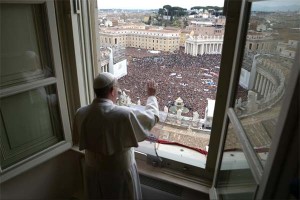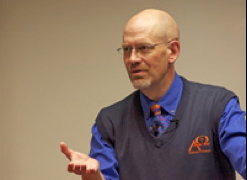 “The Rise of the Papacy” by David Wells – one billion people who are subject to the Pope’s authority. How, one might ask, did all of this happen? The answer, I believe, is far more complex and untidy than Catholics have argued. First, I will give a brief explanation of what the Catholic position is, and then, second, I will suggest what I think actually took place.
“The Rise of the Papacy” by David Wells – one billion people who are subject to the Pope’s authority. How, one might ask, did all of this happen? The answer, I believe, is far more complex and untidy than Catholics have argued. First, I will give a brief explanation of what the Catholic position is, and then, second, I will suggest what I think actually took place.
The Catholic Explanation
The traditional Catholic understanding is that Jesus said that it was upon Peter the church was to be built (Matt. 16:18?19; see also John 21:15?17; Luke 22:32). Following this, Peter spent a quarter of a century in Rome as its founder and bishop, and his authority was recognized among the earliest churches; this authority was handed down to his successors. Indeed, the Second Vatican Council (1962–65) re-affirmed this understanding. Apostolic authority has been handed on to the apostles’ successors even as Peter’s supreme apostolic power has been handed on to each of his successors in Rome.
The problem with this explanation, however, is that there is no evidence to sustain it. The best explanation of Matthew 16:18–19 is that the church will be built, not on an ecclesiastical position, but on Peter’s confession regarding Christ’s divinity. Correlative to this understanding is the fact that there is no biblical evidence to support the view that Peter spent a long time in the church in Rome as its leader. The Book of Acts is silent about this; it is not to be found in Peter’s own letters; and Paul makes no mention of it, which is strange if, indeed, Peter was in Rome early on since at the end of Paul’s letter to the Romans, he greets many people by name. And the argument that Peter’s authority was universally recognized among the early churches is contradicted by the facts. It is true that Irenaeus, in the second century, did say that the church was founded by “the blessed apostles,” Peter and Paul, as did Eusebius in the fourth century, and by the fifth century, Jerome did claim that it was founded by Peter whom he calls “the prince of the apostles.” However, on the other side of the equation are some contradictory facts. Ignatius, for example, en route to his martyrdom, wrote letters to the bishops of the dominant churches of the day, but he spoke of Rome’s prominence only in moral, not ecclesiastical, terms. At about the same time early in the second century, the Shepherd of Hermas, a small work written in Rome, spoke only of its “rulers” and “the elders” who presided over it. There was, apparently, no dominant bishop at that time. Not only so, but in the second and third centuries, there were numerous instances of church leaders resisting claims from leaders in Rome to ecclesiastical authority in settling disputes.
It is, in fact, more plausible to think that the emergence of the Roman pontiff to power and prominence happened by natural circumstance rather than divine appointment. This took place in two stages. First, it was the church in Rome that emerged to prominence and only then, as part of its eminence, did its leader begin to stand out. The Catholic church has inverted these facts by suggesting that apostolic power and authority, indeed, Peter’s preeminent power and authority, established the Roman bishop whereas, in fact, the Roman bishopric’s growing ecclesiastical prestige derived, not from Peter, but from the church in Rome.
The Actual Explanation
In the beginning, the church in Rome was just one church among many in the Roman empire but natural events conspired to change this. Jerusalem had been the original “home base” of the faith, but in a.d. 70, the army of Titus destroyed it and that left Christianity without its center. It was not unnatural for people in the empire to begin to look to the church in Rome since this city was its political capital. All roads in that ancient world did, indeed, lead to Rome, and many of them, of course, were traveled by Christian missionaries. It is also the case that the Roman church, in the early centuries, developed a reputation for moral and doctrinal probity and, for these reasons, warranted respect. Its growing eminence, therefore, seems to have come about in part because it was warranted and also, in part, because it was able to bask in some of the reflected splendor of the imperial city.
Heresies had abounded from the start, but in the third-century, churches began to take up a new defensive posture against them. Would it not be the case, Tertullian argued, that churches founded by the apostles would have a secure footing for their claims to authenticity, in contrast to potentially heretical churches? This argument buttressed the growing claims to preeminence of the Roman church. However, it is interesting to note that
in the middle of this century, Cyprian in North Africa argued that the words, “You are Peter …” were not a charter for the papacy but, in fact, applied to all bishops. Furthermore, at the third Council of Carthage in 256, he asserted that the Roman bishop should not attempt to be a “bishop of bishops” and exercise “tyrannical” powers.
Already in the New Testament period, persecution was a reality, but in the centuries that followed, the church suffered intensely because of the animosities and apprehensions of successive emperors. In the fourth century, however, the unimaginable happened. Emperor Constantine, prior to a pivotal battle, saw a vision and turned to Christianity. The church, which had lived a lonely existence on the “outside” up to this time, now enjoyed an unexpected imperial embrace. As a result, from this point on, the distinction between appropriate ecclesiastical demeanor and worldly pretensions to pomp and power were increasingly lost. In the Middle Ages, the distinction disappeared entirely. In the sixth century, Pope Gregory brazenly exploited this by asserting that the “care of the whole church” had been placed in the hands of Peter and his successors in Rome. Yet even at this late date, such a claim did not pass unchallenged. Those in the east, whose center was in Constantinople, resented universal claims like this, and, in fact, this difference of opinion was never settled. In 1054, after a series of disputes, the Great Schism between the eastern and western churches began. Eastern Orthodoxy began to go its own way, separated from Roman jurisdiction, and this remains a breach that has been mostly unhealed.
The pope’s emergence to a position of great power and authority was, then, long in the making. Just how far the popes had traveled away from New Testament ideas about church life was brutally exposed by Erasmus at the time of the Reformation. Pope Julius II had just died when, in 1517, Erasmus penned his Julius Exclusus. He pictured this pope entering heaven where, to his amazement, he was not recognized by Peter! Erasmus’ point was simply that the popes had become rich, pretentious, worldly, and everything but apostolic. However, he should have made his point even more radically. It was not just papal behavior that Peter would not have recognized as his own, but papal pretensions to universal authority as well.
 On March 14, 2013, Dr. John Piper wrote this ‘clarification’ has only brought further confusion.
On March 14, 2013, Dr. John Piper wrote this ‘clarification’ has only brought further confusion.

 “The Rise of the Papacy” by David Wells – one billion people who are subject to the Pope’s authority. How, one might ask, did all of this happen? The answer, I believe, is far more complex and untidy than Catholics have argued. First, I will give a brief explanation of what the Catholic position is, and then, second, I will suggest what I think actually took place.
“The Rise of the Papacy” by David Wells – one billion people who are subject to the Pope’s authority. How, one might ask, did all of this happen? The answer, I believe, is far more complex and untidy than Catholics have argued. First, I will give a brief explanation of what the Catholic position is, and then, second, I will suggest what I think actually took place.